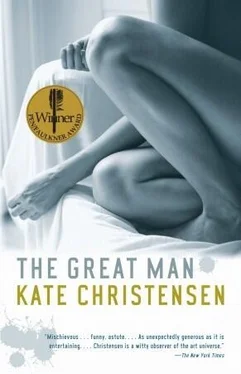She nodded at him with a glimmering of respect. “Oscar took photographs of girls as a teenager. Black-and-white snapshots, just girls being girls, some pretty, some plain, girls in their bedrooms, riding the IRT, walking on the street, shopping, eating ice cream at Schrafft’s, whatever. He even took some of me, shooting from his bicycle as I rode mine up First Avenue, but as you can imagine, he had no trouble finding willing subjects.”
“I haven’t seen them,” said Henry, almost hyperventilating. And he had been on the verge of leaving. Thank God he hadn’t let her throw him out. “I didn’t even know they existed. Where can I get my hands on them?”
“Easily,” she said. “They’re at Brooklyn College.”
“He donated them to his college.”
“That’s right. They’re still there.”
“But he was an art history major! He wasn’t an artist until years later.”
“He fancied himself a good photographer. I admit the photos aren’t bad, some of them, especially the ones he took of Abigail as a girl. He kept all those photographs in a box in his studio for years. He donated them to the college’s archives only a short time before he died. I don’t know whether anyone at the college fully realizes what they are. It seems that they’ve been kept in a drawer, undisturbed since the day Oscar took them in.”
Henry shook his head. “No one knows about them.”
“Well, they’re awfully silly.”
“Why?”
“They were of silly movie star — struck, soldier-worshiping Jewish girls on the Lower East Side in the forties, mostly daughters of immigrants. Our European cousins were beaten and raped, gassed to death, skeletal, shivering with cold, while we put on lipstick and read Emily Dickinson…. It was just the luck of the draw. No doubt our cousins would have done the same in our shoes.”
“Why aren’t they known, these photos?”
“Well, they’ve been right there all along,” she said. “For some reason, I thought you might already have somehow magically divined they were there and dug them up. You have that eager-beaver look about you.”
“Yes, and I’m going to eager-beaver my way over there as soon as I can,” Henry said. “I’ll give you five bucks not to tell that other biographer about them.”
“You’re joking,” she replied, “but I won’t tell him because I don’t like him, so that’s your good luck.”
“Thanks,” he said. “Would it be an intrusion if I asked to see some of the work you’re doing now?”
“Not at all,” she said, gesturing to her studio. Paintings hung on walls and leaned on the floor in stacks. They were, without exception, composed of spare, feathery black fillips against a white background. This new work was more austere even than the older works Henry was familiar with.
“This is my primary work surface,” said Maxine. She pointed to a long steel table painted gunmetal gray, on which, lined up like ammunition in an armory, were a series of tubes and brushes. “I use fifteen different blacks and seven different whites. All oils, of course. I buy them at two different places. One is Pearl Paint, which of course you’re familiar with, on Canal Street. The other is a tiny hole-in-the-wall in the East Village, a place any painter would be smart to know about. And these are my brushes. Sable, camel, and so forth. I am passionate about my brushes and don’t let anyone else touch them.”
Henry set his notebook on the edge of the table while his son lolled against his chest like a drunk in a deli doorway.
Maxine’s cell phone rang. She answered it with mingled hope and dismay. “Yeah?”
There was a brief silence. Henry, who wasn’t looking directly at Maxine, nonetheless felt a sudden chill blow off her skin like dryice fog. “I’ll have to call you back. Henry Burke is here at the moment and we’re in the middle of—”
“You wrote my best friend a threatening letter,” Teddy shot back from across the East River. She was standing in her living room, looking out at an eighteen-wheeler that was trying to negotiate a turn onto her little street, making a hog-killing ruckus of squealing and hissing and grinding as the driver maneuvered its cab between parked cars and tried to ease the massive trailer after it. Why did these meathead truck drivers even try? “Why on earth should she call you before she talks to the biographers, assuming they even contact her?”
“Like I said,” said Maxine with little pointy icicles emphasizing the spaces between each word, “I can’t talk right now.”
“Don’t bother hanging up on me,” said Teddy. “Leave Lila alone. She’ll say whatever the hell she wants to anyone.”
“Except me, apparently,” said Maxine, feeling her lips stretch into the thin reptilian smile of a Dickensian villain. “Since you’re calling me on her behalf.”
“You’re worried she’s going to say something about the bet,” said Teddy. “You didn’t think I knew about it, but I do.” The truck driver’s potbellied partner had climbed down from his comfy shotgun seat high up in the cab and was now standing between two parked cars, trying to wave his arms, as if that would thread the truck through the eye of the needle. The driver went right on with his fruitless racket. What the hell did they want with India Street? Maybe they thought they were taking some sort of crafty shortcut up to McGuinness, inexplicably bypassing the wide, smooth, easy-to-negotiate Greenpoint Avenue.
Maxine was pacing around her studio, trying to seem nonchalant while she felt both of Henry’s inner ears waving all their little antennae toward her conversation, even though he was pretending to be absorbed in his baby. What sort of friendship do Lila and Claire have, Maxine wondered, if Claire knows about this? Maxine had no close friends, unless you counted Oscar’s widow, Abigail, and her assistant, Katerina, but these were friendships born of proximity and shared concerns, not inspired by deeply personal confidences exchanged over tea or bourbon, or whatever people exchanged them over. The habit of solitude was too deeply innate and ingrained for Maxine ever to even think of seeking out someone else’s company for no other purpose than exposing her soul and seeing another’s laid bare. Social commerce was nothing but a big chore. She didn’t understand what hidden, silent, well-oiled mechanisms linking two people would cause Lila to tell Claire — or maybe Oscar had told her.
Here was Henry’s scandalous little secret about Oscar. Of course he could never find out about it.
“I will call you back later,” Maxine said. “I have your number stored in my cell phone now.”
“Isn’t that a neat invention,” said Teddy; she hated the very thought of cell phones and had kept Homer Meehan’s monstrous old telephone, which appeared to date from the dawn of the Touch-Tone era. It still worked fine except for a loose wire; you had to jiggle the receiver every so often, but it always paid off.
Maxine grunted a good-bye, then closed her phone, shoved it back into her hip pocket, and strode in horror about her studio, which suddenly looked as unfamiliar and naked in its new anal-retentive cleanliness as her own shorn head in the mirror appeared to her after a particularly blistering haircut.
“That was Claire,” she informed Henry. “As the old Italians say, she gives me agida. ”
“Is that unusual for her to call you?”
“Unusual,” said Maxine, “like a sighting of the Loch Ness monster, or even more so, because she’s never called me before. I think she wants to make nice, now that you boys are poking around. Extend the olive branch.”
“And you weren’t biting.”
“I’ll call her back. We’ll kiss and make up.”
“My first biography was of Greta Church,” said Henry, “which was published three years ago and which I bet you haven’t read.”
Читать дальше












